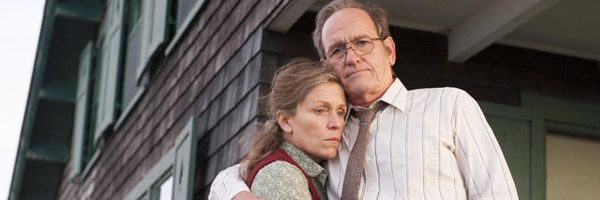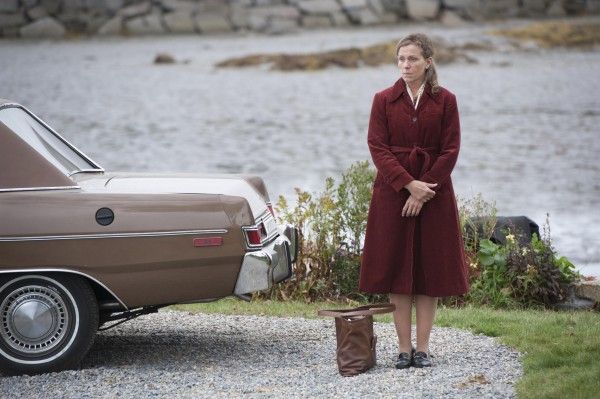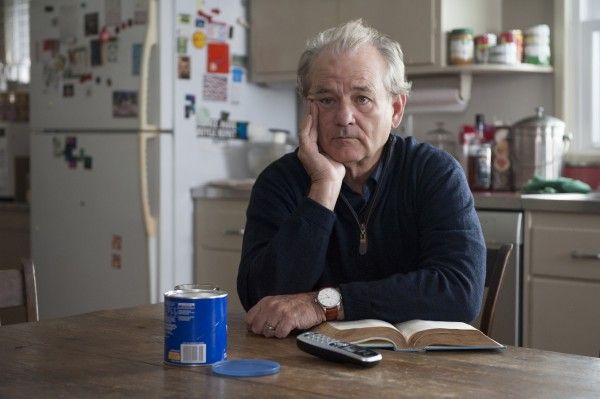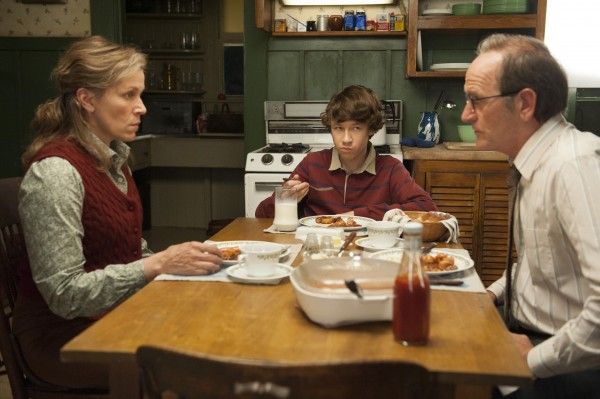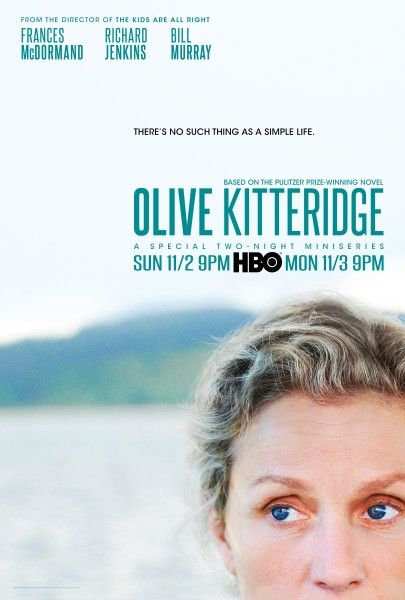It's that time of year, in between HBO's fall and winter series, where it runs a highbrow miniseries event that immediately flies to the front of Emmy contender lists. These tend to be acting showcases based on literary adaptations; Mildred Pierce, starring Kate Winslet, is a recent example. This year, it's Olive Kitteridge, based on a 2008 Pulitzer Prize-winning novel by Elizabeth Strout. The novel, like the miniseries, explores a number of vignettes in and around a small, coastal Maine town, connected through the middle-aged Olive, over the course of 25 years. Hit the jump for why "I'm waiting for the dog to die so I can shoot myself."
Directed by Lisa Cholodenko (The Kids Are Alright) and adapted by Jane Anderson (Normal), Olive Kitteridge is an unflinching survey of many lives, through the lens of a very acerbic one. The series opens with Olive (an uncompromising Frances McDormand) kneeling on a blanket she's laid on the cold ground, looking up into the sky and cradling a pistol. That bleak moment, interspersed with Olive regarding some of the natural beauty around her, sets the perfect stage for the story to come, which first jumps back 25 years.
Throughout its four parts (each one-hour in length; the miniseries will run on two consecutive nights), Olive is occasionally the main character, and sometimes just an observer. At the start of the story, Olive is a middle-aged school teacher, whose husband, Henry (the impossibly, perfectly understated Richard Jenkins) is the town's pharmacist. Their son, Christopher (played by Devin Druid here, and by John Gallagher, Jr. as an adult) struggles to find his place between his caustic and hard-line mother, and his sentimental father. But the first hour truly belongs to Henry, who has a weakness for the meek, doting -- in occasionally extreme ways -- on his pharmacy assistant, Denise (Zoe Kazan).
Yet right from the start, Olive Kitteridge is also mired in something much darker. A shroud of death -- more specifically, suicide -- hangs over all of the stories. Death comes early in Olive Kitteridge, and it doesn't cease. Characters struggle to end it all, or it simply happens to them, but either way, death and Olive herself are the story's constants (as well as Martha Wainwright as a lounge singer, whose performances often intertwine with key moments for the Kitteridges).
Characters and stories flow in and out of the miniseries' four episodes, referencing one another, or being forgotten, just like in real life. For example, a young boy seen briefly in the first hour becomes a major character in the second, before disappearing completely in the third. That second hour is really his story, where he fights suicidal urges long after the suicide of his mother, because he believes he has inherited her schizophrenia. The directing backs this up, but it does so in a fluid way, not in a way that feels forced. It also plays into the miniseries' overall theme, which is consistently focused on psychology, repressed Yankee emotion, and circularity.
Despite these heavy ideas, there is some humor in Olive Kitteridge, but most of it is wry, or the product of Olive's blunt-force verbiage. It's not easy to like Olive, and it's not really required that you do. Somewhat like Larry David in Curb Your Enthusiasm, Olive is an asshole in a world of even bigger assholes (or saps -- one of her favorite putdowns -- something she seems in some ways terrified of becoming, though she does occasionally betray a more tender heart). But like the series as a whole, there's something entrancing about Olive that can't easily be defined. More than likely, it just comes down to McDormand's nuanced portrayal, particularly when Olive is caught in rare moments of emotional breakdown. Her admission of her flaws feels universal, even if it's also easy to judge her harshly.
A note on structure, though: while I haven't read the novel on which the miniseries is based, the format doesn't seem to quite do it justice. Many stories are only hinted at, begging to be explored more fully. Yet in the opposite sense, the flashbacks that happen within the series also stay to scenes viewers have already watched, as if nothing happened before the series takes up (except for a mention of an early trauma that Olive endured). In some ways it doesn't matter; the point is to examine a life coming to a close, and the brutal honest truths, as well as tender moments, of a long marriage. In other ways, however, it feels like padding.
Ultimately, though, the dialogue is quick and snappy, the acting is on another level, and there are some strange, almost Lynchian moments that make Olive Kitteridge a fascinating, if not a particularly upbeat watch. Late in the story, Olive finds as a friend and companion an irascible jerk named Jack Kennison (Bill Murray) who is a match for her in the best and worst ways. His injection of life and humor into the end of the series brings into focus just how slow and difficult the last two hours of it have felt. Olive's life is slowing down, and to match it, Olive Kitteridge does the same. It leaves the miniseries as not a meditation on life, but on choosing to not die. As a reference in the story to a John Berryman poem reads, "save us from shotguns & father's suicides." It's not necessarily the most uplifting of messages, but it suits Olive's pragmatism just fine.
Olive Kitteridge will air on consecutive nights on HBO, starting Sunday, November 1st at 9 p.m. ET. with Parts 1 and 2, followed by Parts 3 and 4 on Monday, November 2nd.

